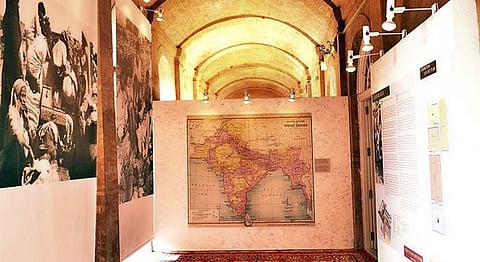
- HOMEGROWN WORLD
- #HGCREATORS
- #HGEXPLORE
- #HGVOICES
- #HGSHOP
- CAREERS
- ABOUT US
- CONTACT US

“Our families were splintered apart.”
“He said he would be back in a year. We waited for several years, but he never came back from Pakistan.”
“Many families wanted to stay in India, but they were caught up in the frenzy of the partition and the violence.”
“They would bring their little children to my mother, who would bring them home in her car, hide them under our beds, and then send them safely to Hyderabad or other states.”
“An uncle of mine who was head of the Congress district committee of Jhang, sent his family earlier, and told them he’d only get on the last train. When he was getting on, he got stabbed in the back.”
Tales of trauma, the pain of losing loved ones and their homes, echo in Amritsar’s Town Hall, now home to the world’s first ever Partition Museum. An idea that had taken root several years ago, was put into action by The Arts and Cultural Heritage Trust under the guidance of author Kishwar Desai. The museum functions as a physical entity dedicated to documenting the living memories of the last possible generation; a trait Kishwar Desai credits to the immense response the museum is getting.
“To be honest, we got very lucky. Before the museum was initially set up, we did a series of events to start with. Our first event was in 2015, at the India International Centre in Delhi. People questioned the idea immediately, since partition is a difficult subject to deal with. It’s of a sensitive nature. People assumed only 10-15 people would show up, but over 1500 people showed up, several of whom couldn’t get in due to space constraints,” explains Kishwar Desai.
The idea was put forth in the 1960s, and has been long pending. Making use of social media and the ever ready press after their first event, they established a connection with the youth. Several young people wanted to volunteer, as well as connect them to their grandparents who had stories or items to add to the museum’s collection. The second event organized, was at an Art Fair, where they decided to start recording whoever wished to share oral histories. Again, they didn’t expect much of a response as it was just something they were trying, but 70 people came forward, willing to record their stories.
From thereon, the four founder trustees, Bindu Manchanda, Dipali Khanna, Kishwar Desai, and Mallika Ahluwalia, knew they would need a space of their own, as each event kept garnering more attention. In that aspect, the Government stepped forward to help, after noticing their efforts, and gave them their very own space in Amritsar — The Town Hall.
“Amritsar was an apt place for the museum, because it was on the front lines of Partition. Hundreds of thousands of refugees found their first solace in Amritsar, after fleeing their homes. Amritsar itself was partitioned from its sister-city Lahore. To have the museum in a city that witnessed so much, in a colonial building of Amritsar is fitting,” explained Mallika Ahluwalia. It is also conveniently located near the Golden Temple, which is a mere 10-minute-walk away from the museum.
Currently, the museum’s exhibits include oral histories, official government documentation (including Mountbatten’s personal, secret report on the events leading up to partition), photographs, art installations, Partition-related art, letters, newspapers, and other personal objects belonging to refugees.
Inaugurated on Punjab Day, October 24, the museum is run by people who have sacrificed their careers, as well as pay, in an effort to pay homeage to our country’s past. Organisations like the Hindustan Times and Airtel stepped in as supporters, too.
“When it comes to connecting with the older generation though, a physical space is better for them to open up. When Gulzar came, it was an outreach program. Over 15,000 people came for the play, and his talk in February!” exclaims Kishwar Desai, thrilled about the immense response the museum is still receiving. Till date, the museum continues to host pop-up events, or lectures on random occasions as well as to commemorate certain days.
For more information and updates, visit their website, or Facebook page.
Feature Image Credit — Nat Geo Traveller
